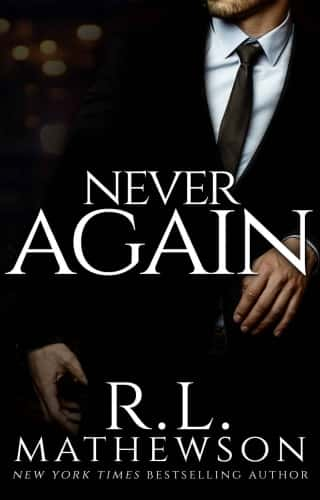Chapter 17
SEVENTEEN
T he clock was about to chime midnight as Yates paced the study behind Lavinia and another collection of files, but this time he had no desire to force her to abandon her work and go to bed. For that matter, he’d abandoned his initial thought that she’d better stay at her own house tonight, given the lack of proper chaperone, and decided that since no one even knew she was in London, no one could get upset that she was here in his study.
Besides, Merritt was here. Respectable married man and all that rot. True, he was currently asleep in the armchair in the drawing room—hadn’t even noticed when they’d adjourned to the study—but even so. Ought to count for something.
As long as Xavier didn’t get spiteful, they’d be fine.
Lavinia lifted a hand, wiggled her fingers. “Griffin?”
Yates spun to the cupboard. “Cecil or George?”
“George.”
He pulled out the dossier, turned to hand it to her—and froze.
A man lounged in the doorway, looking perfectly at home, despite the fact that Yates had never seen him before. He looked to be about his own age, with the sort of unremark ably pleasant face that would be invisible in a crowd. Until he smiled. “No offense, mate, but you could use a maid. This place is a ruin.”
Yates smiled back. He’d locked every door and window when he came back in with Lavinia, set a few noise-making traps, and had told Neville to keep his ears out for a late-coming guest. Yet here he stood, nothing to have given him away. “Barclay, I presume?”
“Lucy passed along your ... invitation.” He straightened, and the lazy challenge on his face turned serious. “And what you did for her, before some lout could touch her in that place—there are no words.”
“We don’t need words.” Yates turned a bit, inviting Barclay into the room. “What we need is a crew, and it sounds as though you have one. And according to Rabbit”—he’d summoned him the moment he had Lavinia safely locked away—“you have the best one in London. He says your gang is the only one that can move among the ‘rich blokes.’ Is that true?”
Amusement flickered onto the man’s face. “If he means ‘and get away with it,’ then yeah. True enough.” As if a switch had been flipped, his eyes went glinting and his face hard. “This about the Empire House?”
Yates nodded.
“Bringing it down?”
“Like a house of cards, if all goes according to plan,” Lavinia said from where she sat on the floor, surrounded by scattered dossiers and case files.
Barclay’s gaze flicked down to her, back up to Yates. “Then I’m your new best friend.” He finally entered, pushing off the doorjamb and moving into the room with the kind of silent grace Yates had learned from the Caesars.
His Cockney wasn’t as noticeable as Lucy’s. If he weren’t so tired, Yates would have noted that straight off. He’d have been willing to bet this fellow hadn’t been born and raised in Poplar.
But this Barclay’s history was irrelevant unless it would help with the case. “Here’s what we’re dealing with.” Yates plucked a few sheets of paper from the reams of notes Lavinia had already taken and spread them onto the desk for Barclay to review. “We have our primary case—a woman named Samira, currently being held at the Empire House, but who may well be moved in the morning. We need to follow her, if she is. Free her.”
Barclay nodded. “Track and snatch—I usually work with gold and silver, but we can grab a girl in this case. Will she put up a fight?”
Would she? He had to think not, at this point. “Shouldn’t.” He tapped the next sheet of paper. “Technically, that would solve our case. But we’re not letting this go. Hence the shopping list.”
Barclay picked it up and whistled. “This kind of equipment costs a pretty penny.” He quirked a brow. “Define shopping .”
“By the dictionary. We’ll provide the funds.” It hurt to even say it. The cameras were about the only reasonable thing on the list—add in the rest and Alethia’s retainer would be nearly used up. Especially if he charged the meal at Kettner’s to the company’s tab.
Lavinia must have detected the pain. “My list, my treat. Consider it my entry fee into the organization.”
He should argue—but frankly, he couldn’t afford to. He covered the discomfort of it with a grin aimed at Barclay. “In that case, go wild. She’s loaded.”
That mix of amusement and danger flitted over his face again. “Rich ladies aren’t as bad as rich gents. Most of the time.” He jerked his chin up when he met Lavinia’s gaze. “Lucy said you gave her the necklace. She’s generally too sweet to lie, and she knows better than to bite the hand that saved her life, but...” He paused, frowning.
Yates glanced over to see why. She was taking off the matching bracelet and holding it out. “Vin. Seriously.”
“Hate to break up the set.” When Barclay didn’t reach for it, she levered onto her knees and set it on the desk. “Our circle is doing this, Yates. Stealing women and children from the places meant to help them. Snatching them off the streets to feed their twisted appetites. Because they know very well they can hide behind their wealth, that it will protect them.” She swallowed, her larynx bobbing. “I won’t be that kind of person. That bracelet means nothing to me, but it could help feed that little girl.”
“And her adorable band of ragamuffin family members besides.” Barclay picked it up, but it didn’t vanish into his pocket like the necklace had in Lucy’s. He tossed it up and down, not taking his eyes off Lavinia. “The job—your plan. It involve the bobbies?”
“Not in the way you mean,” she said, sitting back on her heels. “Though a few of them are on that other list in front of you. Our suspects.”
“Targets,” Yates corrected.
“Marks.” Barclay grinned. “Learn the lingo, mate. And good—I don’t fancy getting pinched. More, wouldn’t do any good. Probably quite a bit of harm to the women involved, actually.”
Yates lowered himself to the desk chair. “How so? Not that we’re involving the police—but out of curiosity.”
Barclay set the bracelet down again. “Didn’t imagine you had any cause to know the prostitution laws, but they’re designed to protect upstanding folks like yourselves from the ‘nuisance’ of women making their living from the streets. So say Sally or Sue is brought in by the bobbies because she waited too long on a corner for an omnibus and turned to ask some bloke if he knew when it would arrive—the bobby doesn’t need evidence. Just has to say she was being a nuisance, and she gets locked up for a few weeks, her kids go hungry, and now she’s got an arrest record. Know what that means?” He leaned forward, tapped a finger to the desk. “Means she’s now labeled a common prostitute. And the next time she steps out for a loaf of bread, well, she better be sure not to jostle anyone in line or look at ’em crosswise. Because now she’s got that label, she can be brought in for anything. Anything . More time in jail, kids going hungry again. Most likely, the job she found at the factory or washroom is gone. So now what? What can she do but resort to the thing she was accused of?”
Yates shifted in his chair, rather regretting the question. If Hemming ever realized he’d had his daughter present during a conversation on this particular subject, he could only imagine the consequences.
Barclay straightened again. “The johns, they don’t need to worry. Especially if they’re gents seeking a bit of diversion. It’s technically illegal for them to participate in the trade, but it’s only the women arrested for it. The blokes can be caught in the act and given a shake of the head. And the pimps?”
Yates winced and snuck a glance at Lavinia. He really, really shouldn’t have invited this conversation. Though with a bit of luck, she wouldn’t even know the word.
Barclay was the sort to notice the reaction, but he didn’t seem to care. “That isn’t even a crime. There’s no law in England making it illegal to force a woman into that situation, or to find the johns to use and abuse her.”
“What?” Lavinia surged to her feet, fury in her eyes. “You mean to tell me what these men are doing isn’t even illegal ?”
Barclay shrugged. “That part, technically? No. You could try for kidnapping, but that would never stick for the girls Lucy said were there. White girls like you, sure. They’d care. But ones with darker skin? Who don’t speak English so fine and proper?” He looked as disgusted as Lavinia had sounded, and as Yates felt. “It would never stick. And we know it ain’t the kidnapping bit that’s the real crime. The patrons, now—again, technically illegal. But no one prosecutes them for it.”
Lavinia gripped the edge of the desk. “We’re going to stop them. These men, at least. And then you ,” she said, turning a look on Yates so slicing he had to wonder what he’d done to deserve the cut, “are going to change the law.”
“I’m ... what?”
She pointed out the window. “Stop skipping the Sessions whenever they bore you and voting however is expected and start making changes. The system’s broken. You’re an earl. Fix it .”
Barclay might have been trying to fight down the grin, but he was failing. “Cheers.”
Yates pinched the bridge of his nose and pulled the chair closer to the desk. “I don’t skip Sessions because I’m bored, Lavinia. I skip them because I’m working for my bread.”
“Well, you won’t have to worry about that once you marry Alethia, so you’ll have no more excuses.”
Hopefully to Barclay, the words sounded casual and even. To him, they sounded like an accusation. “Can we not talk about her as if she’s only a dowry?” He meant to add something about not planning a wedding with someone he’d yet to know for a fortnight, but his mouth snapped shut at the look on her face.
Hurt. Betrayal. Worse, resignation. Things he’d seen far too much of that night.
But he wasn’t supposed to see them in her . She was Lady Lavinia Hemming. She was supposed to be safe from that kind of pain.
Then he remembered that he’d been so busy facing off with Xavier over who had the right to try to win Alethia’s next smile, he hadn’t even noticed when one of his oldest friends slipped out into the night. Alone. To apparently go spy on a man they suspected of the worst sort of crimes against women, without so much as an electric torch to use as a baton if someone tried to attack her.
He’d done that. He’d done this—put those shadows in her eyes. Not her mother, not Barremore or Dunne or Rheams. Him .
Barclay cleared his throat. “Right. Job? Anyone?” He reached for the list of so-dubbed marks and read over it. His frown deepened the lower his gaze dropped on the page. “The starred ones—main marks?”
“Yes. Board of directors.” Yates tore his gaze from Lavinia’s and put it back on Barclay. “Second column is known players. Third is suspicious associates. We focus our energies on the first and what of the second we can manage. If we have the time and resources to gather information on the third, we do. But they’re not the primary tar—marks.”
Barclay nodded, lowered the page. Met his gaze. “And what about the victims? The women? What happens to them when you tear this house down?”
Yates opened his mouth, closed it again.
“We hadn’t got that far.” Lavinia deflated, rubbing at her eyes. She must be every bit as exhausted as he was. “Perhaps with these men out of play, the legitimate charities can be called upon to do their work.”
Barclay pursed his lips. “Or ... how deep do your pockets go, Lady List-Maker? You know what they say, I trust, about the best way to be sure things are done right.”
Lavinia leaned back against the filing cupboard. Her eyes had gone distant in a way that said the idea was spinning through her mind. “I’ve never run a charity. Never really worked with one, to be honest. I’m afraid the last six years of my life, I’ve been rather useless.”
“Then the next six, you reverse the pattern. You don’t strike me as the type to give up until you’ve done a thing.” Barclay shrugged and went back to the list. “And evidence of my theory, right here. Quite an undertaking. Please tell me this isn’t meant to be accomplished in a day. If so, I’ll have the regrettable duty of informing you it isn’t possible.”
Ideally, it would be done yesterday. Last year. Three years ago, when the Empire House first opened its doors.
But they knew their plan was too involved to be immediate. They had to be thorough. Otherwise they’d fail. “How long do you think it’ll take?”
Barclay touched a finger to a few lines on the shopping list, cross-referenced their other notes, and sighed. “Ideally? A couple months. We can’t guarantee any of these blokes will be there in any given time range, and that would give us ample opportunity to get what we need on them.” He looked up, eyes hard. “But knowing there’s at least one other little girl in that place, younger than Lucy . . . two weeks? Maybe three. We’ll work as fast as we can.” His gaze flicked to Lavinia. “And we won’t spend your money without cause. These are our people they’re misusing. My sister they grabbed.”
Lavinia nodded. “I trust you.”
Their guest laughed. “You shouldn’t. If ever you misplaced a bauble at a ball, it could well be one of my sisters who helped the latch come free. But you’ll have our protection now, both of you, I promise you that.”
The protection of a thief. A gang leader. A decade ago, Yates might have laughed at the idea. Today, he’d take it with gratitude.
He leaned back in his chair. “And I’ll do a favor for you too.”
Barclay lifted a brow. “You already did. Lucy.”
“Another one.” He smiled and folded his arms over his chest. “Lessons.”
“On scaling walls? We make do well enough as we are, thanks.”
Yates shook his head. “On diction. Accent. Grammar and vocabulary. You want to really blend into society? I can help.”
For a moment, he thought Barclay would refuse, out of principle if nothing else. But then he smiled and extended a hand. “You have yourself a deal, Mr. A.”
Barclay stayed another hour, going over the plan’s smallest details, asking questions that uncovered every flaw. Adding what he knew of the city and its inhabitants—which was considerable enough to make Yates think he’d never looked at London before, much as he’d thought he had.
Finally, as the clock struck one, Barclay stood, gathered his copies of the papers, and they agreed on when next they’d meet and how to get in touch in the meantime. He strode into the hall, putting his hat on and then tipping it all in one gesture. “Evening, Colonel.”
Merritt’s mumbled return of the greeting sounded half asleep and half confused. He stepped into view a moment later, rubbing at an undoubtedly sore neck, eyes on Barclay’s retreating form. “Yates? Who was that?”
Yates glanced down at the desk. The bracelet was still there. And the necklace had joined it. He leaned back with a smile. “Our new best friend.”
 Fullepub
Fullepub 



